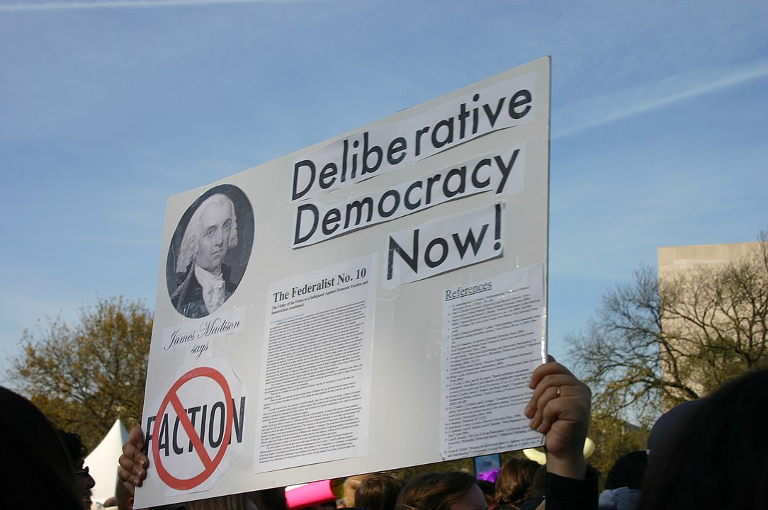Democracy Rising is a series of blog posts on deliberative democracy: what it is, why it’s powerful, why the time is right for it, how it works, and how to get it going in your community. The series originates in the United States but will discuss principles and draw upon examples from around the world. Views and opinions expressed in each post are those of the individual contributors only.
You can read the Introduction to this series on Resilience.org here.
Nine Short Arguments for Deliberative Democracy
In a democracy, being a citizen is essential work.—George Packer[1]
The United States is a country with—in the phrase sadly immortalized by Covid-19—serious underlying conditions.[2] It would be glib and simplistic to say that deliberative democracy[3] is the cure for those conditions, but the premise of Democracy Rising is that DD is a key aspect of the treatment. There are many resources available to those who wish to explore possible reforms to the existing governance machinery, especially at the national level,[4] but our belief and focus in this series is that the dysfunction at the top of our system is both a cause and a consequence of what’s broken at the bottom, and that the power of deliberative democracy is fundamental to fixing that. Below are some reasons why. Several of these points will be developed further in future posts.
- The methods of DD are aligned with our evolutionary psychology and history.
DD aligns with our natures as social primates and affords each person the maximum freedom-within-community that balances our social and psychological needs. DD has roots in bottom-up community governance that go back thousands of years, or even farther.[5] Deliberative democracy takes more work, or perhaps work of a different kind, than submitting to an autocracy, but it is also an antidote to the lure of autocrats—the relief from having to decide how to think and act—and thus to their horrors. The work of deliberative democracy is empowering, because it is shared community work aimed at creating a shared life in which both our human connections and our differences are honored.
- DD leverages our cognitive strengths and helps temper our cognitive weaknesses, and thereby makes for better decisions.
No matter how smart we are, all of us display cognitive weaknesses that can undermine our intelligence. For instance, we tend to make snap judgments, believe the last thing we heard or what we want to hear, overestimate our understanding of complex topics, and credit others according to how closely their worldviews align with our own. Deliberative democracy offers a process that helps check these weaknesses and harness our collective intelligence and wisdom by opening and moderating human-scale spaces where people can explore their understanding, by encouraging thoughtfulness over snap intuition, and by promoting the pooling of knowledge and creativity to crowdsource solutions.
- DD builds social capacity.
DD can help mitigate humans’ tendency toward tribalism by bringing people together in structured venues that encourage respectful exchange and exploration of shared values directed toward solving shared problems. Such collaboration leads to wider buy-in, crowdsourced information and possible solutions to problems, and the social exercise of team-building muscles. This enhances the ability to get things done in a community, which in turn means greater resilience in times of stress and crisis.
- By privileging human-scale encounters, DD is a counterweight to the lack of civility, the rage, and the siloed self-segregation often seen in social media platforms.
Social media and other digital forms of connection have an important role in governance, but unless they are carefully managed and facilitated according to mutually agreed-upon processes, they can encourage grumbling, complaining, and insulting others—all behaviors that can be hugely destructive if the goal is to chart a collective course forward. Social media can reduce or eliminate the social costs of incivility and allow people to hide behind an electronic veil. A key advantage of a small assembly of people—in the same room or on a platform such as Zoom or Skype—is that face-to-face accountable interaction invokes a set of social constraints that tends to encourage civility. Civility lubricates collective action.
- DD leads to a more informed and less credulous citizenry.
People who gather for the purpose of discussing issues and actions will often bring opinions along with them, but also inevitably will hear things they didn’t know—things that will interrogate their knowledge and likely broaden it. Citizens who are thus better informed, both about issues and how politics works, are less susceptible to manipulation and demagoguery. In turn, better citizens make for better politicians. It’s been argued that the world is too complicated for deliberative democracy to work. On the contrary, it’s the complexity of the world that demands DD and other forms of wider and deeper engagement: they harness the power of many brains educating each other to make the complex understandable, as well as the power of mutual efforts to create policy.
- DD is an antidote to the sense of powerlessness so pervasive in modern society.
People who do not take part in the political process—or who have been shut out of it—are often prone to a sense of powerlessness. As Richard Hofstadter pointed out in his classic 1964 essay The Paranoid Style in American Politics, this can lead to a kind of paranoia and suspicion in susceptible people: “Having no access to political bargaining or the making of decisions, they find their original conception that the world of power is sinister and malicious fully confirmed. They see only the consequences of power—and this through distorting lenses—and have no chance to observe its actual machinery.”[6] Deliberative democracy openly invites and encourages people to take part in exercising power, in both its thrilling and mundane aspects, thereby helping to demystify it.
- DD embodies the principle of subsidiarity.
Subsidiarity means situating power at the most fundamental level that’s practical, in the interests of efficiency. The U.S. Congress would not make good decisions about local speed limits, for instance—those are obviously better determined by local communities. On the other hand, if fuel-efficiency standards or carbon taxes (for example) are deemed necessary, they are best set at the national level in order to avoid the economic and regulatory nightmare of a patchwork of varying rules. In many cases there should be a balance, with goals set at national or regional levels but the means of reaching them determined locally.
- Localized communities need forms of governance suited to local circumstances and scales.
If indeed the decades ahead are likely to a time of turmoil and disruption attended by a kind of social and political down-shifting, then we ought to be building a culture of governance that is well suited to localism. DD should be a central part of that culture.
Having said that, however, DD can also be scaled up in ways that can harness its benefits for larger political entities. Future posts will focus on some of those ways.
- DD is governance for grown-ups.
Autocracies cede power to dictators, their captive bureaucracies, and their favored constituents. Republican forms of government cede most power to elected representatives, allowing the citizenry to exercise only remote, periodic, and blunt forms of control over them via elections. This can work well, even for a long time—but long periods without direct engagement by the people themselves almost guarantees that the system will be co-opted by officials and the special-interest cohorts that inevitably surround them. Deliberative democracy is the most responsive and responsible form of governance, because it is ongoing and intimate and because it requires and supports ordinary people in engaging with and taking responsibility for the character of their communities and how they are run.
* * *
These are some of the main advantages of local deliberative democracy. It’s worth noting that there are also risks and downsides to localization, including isolation, xenophobia, factional dominance, racism, and so on. Those are risks to be taken seriously. A future post will take a look at them and the means of mitigating them that have been proven to work in real-world situations.
[1] George Packer, “We Are Living in a Failed State,” The Atlantic, June 2020; https://www.theatlantic.com/magazine/archive/2020/06/underlying-conditions/610261/.
[2] Among those conditions is the fact that some elected officials seem not to believe in democracy; consider this Twitter message from Utah Senator Mike Lee: “Democracy isn’t the objective; liberty, peace, and prospefity [sic] are. We want the human condition to flourish. Rank democracy can thwart that.”
[3]Democracy is more than just voting, and deliberation is more than just talking. In this series, “deliberative democracy” means a vision of governance that:
- is locally focused;
- invites citizens into structured and modulated gatherings (in person and/or online) to support ongoing, respectful, and public dialogue, exchange, and mutual education;
- engages ordinary people and strives to be broadly inclusive of all community members;
- is based on solid, balanced information and transparent processes; and
- addresses “wicked” issues and aims to arrive at public judgments about them that are rooted in participants’ values and firmly and consistently linked to policy outcomes.
[4] For example: David Orr, Andrew Gumbel, et al., Democracy Unchained: How To Rebuild Government for the People (New York: The New Press, 2020); Daniel Kemmis, Citizens Uniting to Restore Our Democracy (Norman, OK: University of Oklahoma Press, 2020).
[5] Francis Pryor, Home: A Time Traveller’s Tales from Britain’s Prehistory (Penguin Books: 2015); John Gowdy, ed., Limited Wants, Unlimited Means: A Reader on Hunter-Gatherer Economics and the Environment (Washington, DC: Island Press, 1998); Kim Sterelny, “How Equality Slipped Away,” Aeon, June 11, 2021, https://aeon.co/essays/for-97-of-human-history-equality-was-the-norm-what-happened?utm_source=Aeon+Newsletter&utm_campaign=efb2f46b7d-EMAIL_CAMPAIGN_2021_06_11_12_54&utm_medium=email&utm_term=0_411a82e59d-efb2f46b7d-71567072.
[6] Richard Hofstadter, “The Paranoid Style in American Politics,” Harper’s Magazine, November 1964; https://harpers.org/archive/1964/11/the-paranoid-style-in-american-politics/?single=1, viewed March 30, 2021.
Teaser photo credit: Call for the establishment of deliberative democracy on the Rally to Restore Sanity and/or Fear. By Ryan Somma from Occoquan, USA – Rally to Restore Sanity: Deliberative Democracy Now!, CC BY-SA 2.0, https://commons.wikimedia.org/w/index.php?curid=64269094





